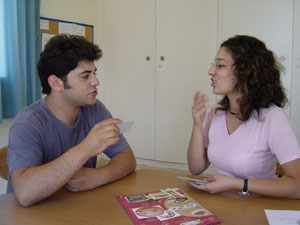Speech-Language Therapist
Tasks & duties

Speech-language therapists may do some or all of the following:
-
accept referrals from schools, medical professionals, clients and their families or caregivers who are concerned about communication and swallowing problems
-
provide resources and information to clients and their families or caregivers
-
assess and diagnose communication delays, disorders and swallowing disabilities
-
co-ordinate and plan the details of treatment
-
develop and use treatment programmes
-
work on communication and swallowing disabilities with the client, their family or caregivers and their education institute
-
counsel, support and advise clients and their families or caregivers, teachers and employers about communication and swallowing disabilities
-
use books, computers and other communication aids to help people communicate
-
make written and oral reports about the client, the intervention strategies used and the client's progress
-
provide support to schools and pre-schools through teacher and parent or caregiver development programmes
-
support and promote appropriate care and services for people with communication difficulties
-
visit pre-schools, schools, hospitals, rest homes and families
-
take group therapy sessions
Specialisations
Speech-language therapists may specialise by working with particular groups of people, such as:
-
pre-school children (paediatrics)
-
the elderly
-
children and adults who have swallowing or communication disorders
In New Zealand the two main industries that speech-language therapists work in are education and health.
Skills & knowledge

Speech-language therapists need to have:
-
knowledge of speech and language
-
skill in managing speech, language and swallowing problems
-
knowledge of the human body and its physiology
-
understanding of medical conditions that can affect speech
-
knowledge of psychology and education theory, and child development and health
-
knowledge of community and family support services, and where to refer their clients
-
good communication skills
-
teaching skills
-
research skills
-
planning and administration skills
Entry requirements
To become a speech-language therapist you need to have a Bachelor of Speech and Language Therapy, or an equivalent qualification that meets the requirements of the New Zealand Speech-Language Therapists' Association (NZSTA).
Secondary education
A tertiary entrance qualification is required to enter further training. Useful subjects include biology, chemistry, health science, and English.
Tertiary education
Three universities in New Zealand offer speech-language therapy courses:
Massey and Canterbury universities offer the undergraduate Bachelor of Speech and Language Therapy (BSLT), while Auckland University offers a postgraduate course, the Master of Speech Language Therapy Practice (MSLTPrac).
Training on the job
Speech-language therapists regularly attend training sessions and courses, and must keep up to date with new trends and information.
To remain members of the New Zealand Speech-Language Therapists' Association (NZSTA) they are expected to acquire 45 Continuing Education Points (CEPs) every three years by sitting examinations and attending training courses and seminars held by the NZSTA.
Related courses
Speech Pathology
For more information, please refer to Career Services.
Document Actions
